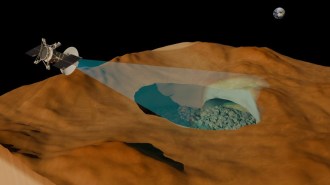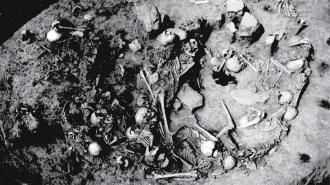All Stories
-
 Life
LifeAn African monkey ate a rope squirrel and came down with mpox
Fecal analyses and necropsies suggest a fire-footed rope squirrel was the source of a 2023 mpox outbreak among sooty mangabeys in Côte d’Ivoire.
-
 Animals
AnimalsIntricate silk helps net-casting spiders ensnare prey in webs
Rufus net-casting spiders can tune the stiffness and elasticity of their webs thanks to loops of silk, scanning electron microscope images reveal.
-
 Health & Medicine
Health & MedicineA lab on wheels is tracking HIV spread in war-torn Ukraine
During a test drive, the mobile lab van uncovered a drug-resistant HIV strain that sprung up after the ongoing war with Russia started.
By Kamal Nahas -
 Planetary Science
Planetary ScienceVenus has a massive lava tube
A collapsed lava tube detected in 30-year-old radar data from Venus may be part of a much wider network of underground caves.
By Tom Metcalfe -
 Archaeology
ArchaeologyIron Age mass grave may hold unusual victims: mostly women and children
A land dispute may have led to the massacre 3,000 years ago, suggesting Europe’s transition to farming wasn’t always peaceful.
By Tom Metcalfe -
 Genetics
GeneticsWanderlust may be written in our DNA
A new study suggests that inherited traits explain a small but measurable share of why some people relocate far from where they were born.
By Elie Dolgin -
 Health & Medicine
Health & MedicineThis itch-triggering protein also sends signals to stop scratching
The TRPV4 protein’s dual nature, found in studies with mice, may complicate the hunt for human itch treatments
-

Finding the story
Editor in Chief Nancy Shute discusses how our reporters find unique stories, from vaccine beer to a particle collider’s retirement to the rise of AI scientists.
By Nancy Shute -
 Health & Medicine
Health & MedicineMeds like Ozempic could ease arthritis
A study in mice and people with osteoarthritis suggests semaglutide can bulk up cartilage between bones, though bigger trials are needed to confirm.
By Meghan Rosen -
 Science & Society
Science & SocietyProject Hail Mary made us wonder how to survive a trip to interstellar space
We can take some clues from hibernation and cryogenics, but humans aren't yet built for that kind of deep sleep.
-
 Climate
ClimateHalting irreversible changes to Antarctica depends on choices made today
Antarctic Peninsula projections show accelerating ice loss, warming oceans and global sea level impacts tied to greenhouse gas emissions.
-
 Chemistry
ChemistryMachine learning streamlines the complexities of making better proteins
The framework predicts how proteins will function with several interacting mutations and finds combinations that work well together.
By Skyler Ware